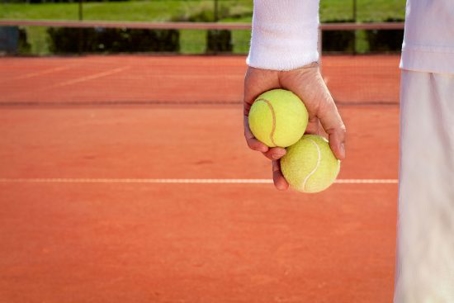"Penny Saved Is A Penny Earned" Ⓒ Benjamin Franklin
Those who bear this principle wisely throughout life, feel a strong confidence in the future. The keyword here is the word ‘wisely.' Whether we are talking about a delicious meaty hamburger or that fancy bag with an attractive discount, both tend to be a spontaneous expense, which bring us satisfaction but don’t provide much practical use. Following Mr. Franklin’s advice and saving your penny for a more useful purchase is an excellent approach to reduce anxiety and improve the way of life.
That is precisely the way medical insurance and money deposits work. Paying a reasonable charge at a given moment in the present prevents unexpected considerable losses in the future. In other words, we literally spend money to save money. Why should tennis court owners relate to Franklin's saying? Let's see how one can save money performing regular maintenance of their tennis court.
ITEM OF EXPENDITURE
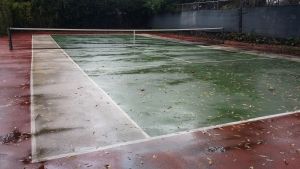
There are two kinds of people, those who are obsessed with tennis and those who provide others with pleasure to play it. Both are concerned whether the tennis court fulfills its purpose or not. An operationable surface, well-visible markup, stable net and unbroken fencing – all these aspects must fit player expectations. And so they do, when you have your new court freshly built and painted. However, like any other construction object, the court occurs to be an asset, which needs maintenance. Time, weather, and physical impacts influence its value. It loses durability all the time, and in a few years your tennis court doesn’t look so new and can even bring a potential hazard to players. Let's take a look at what issues occur and how to deal with them.
MINOR SURFACE ISSUES
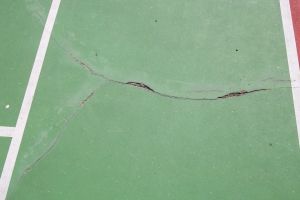
Discoloration is usually the first thing that court owners encounter. Regardless the roughness of pavement and its geographical disposition, any surface is influenced by sun heat and human feet. The everyday impact of those factors changes the color of the surface. It decreases the visual contrast between the primary color and markup thus affecting player’s perception of the game. However, this defect is easy to fix if you call a professional.
Scaling is also a ‘common illness’ for tennis courts and is caused by the mentioned above factors. This defect is not terrible itself but can cause undesired issues in a long-term perspective such as disintegration and distortion of the main solid layer. These problems occur because water penetrates gaps from the surface and slowly ruins lower layers (pavement foundation, for instance.) Early recognition is the only way to prevent court disintegration and distortion from happening. A professional contractor can easily diagnose the symptoms during regular maintenance.
Cracking occurs to be the most common surface issue. It may look quite harmless at the beginning, but if allowed to proceed further and reach subgrade, the structure will have to be replaced completely. It is strongly recommended to fix small cracks before it gets serious. The best way to deal with cracking is to have Armor Crack Repair System professionally installed. Applying an Acrylic Coating product afterward would protect fixed areas from further destruction and prevent water from getting inside. Needless to say that only a highly qualified contractor should perform this work. Otherwise, you risk spending money thinking that the cracking issue is gone for good, while it is not.
MAJOR ISSUES
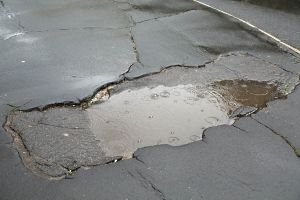
Leave your court unattended for several years, and you will see far-reaching consequences of mother nature’s force. Regardless of material being used, any outdoor surface is seasonally affected by heating and freezing. Even if you have not used the courts for playing, the constant element exposure will steadily ruin the pavement on a molecular level. Even the finest built all-weather courts eventually will have its surface covered with potholes, low spots, and the minor deformities we mentioned earlier. In addition to an unpleasant view and game inconveniences, these issues may even cause injuries to players!
Formation of potholes and so-called ‘bird baths’ means that the integrity of the lower pavement layer is broken. The only right option here is to remove the old surface and overlay it with a new 9.5mm asphalt layer.
WHY IS IT IMPORTANT TO PERFORM ANNUAL MAINTENANCE ON YOUR TENNIS COURT?
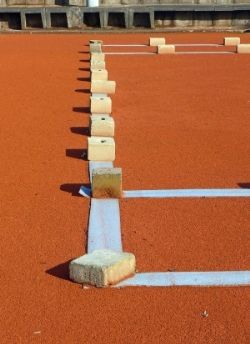
As you can see, tennis courts are an asset that requires regular care. Our "Annual Maintenance Agreement" guarantee Ms that your tennis court will look excellent, stay durable and resist the weather elements, which badly influence your court. Thus, players will always be satisfied with the game. Whether you play tennis in your backyard once a week or your courts are occupied all day long by experienced players, the main impact is caused by the seasonal switch. Therefore, it is strongly recommended to perform maintenance once a year in order to prevent unexpected issues and save your money.
CALL PROFESSIONALS
It is possible to fix some issues yourself, but even the minor ones require a bulk of knowledge, special equipment, commercial grade materials and a lot of effort. So, what is the point to risk damaging your court instead of repairing it? Call a professional contractor now to ensure your peace of mind in the future.
If you live in Maryland, USA or close to it, the right choice is Mid-Atlantic Asphalt, Inc.

More than 45 years our family owned and operated company builds and maintains asphalt surfaces for almost all kinds of activities. Whether your project is a new construction or rehabilitation, Mid-Atlantic’s professionals will ensure the highest quality while meeting your time demands and financial opportunities. Contact us at (410) 999-1263.

